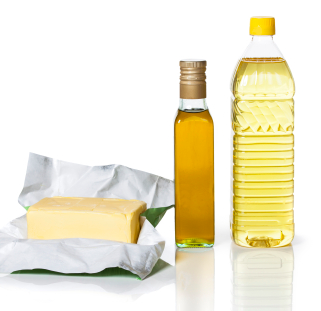The other day I got a text from my west coast counterpart asking if I could write a post about which oils are the best to use for cooking. At the time when I received the request, I was listening to this song, which made me feel like this topic was so incredibly edgy and badass. Now that I’m sitting down to write it I realize it may not be such a crazy exciting extravaganza to everyone, but hey, whatever gets me amped up to write.
Oils can be confusing and there is a ton of different information out there. To be honest, the topic actually intimidates me a little bit because there is so much controversy surrounding it, but I gave it my best shot here. :)
Which oils should be used for cooking? Which oils shouldn’t be heated? Which oils shouldn’t be used at all?
Here’s what I can gather from my research.
BEST FOR COOKING:
Coconut Oil – Unrefined, extra virgin coconut oil is the best oil ever. It’s great for cooking because it remains fairly stable under heat (meaning it can stand higher heat cooking without breaking down and becoming rancid/toxic). It does have a coconut flavor, which I think is delicious and perfect. Super good for baking. Some people don’t like the coconut taste, but I think they should get over it because it rocks and has a lot of health benefits. (Or, use grass-fed butter instead). I love the taste of Nutiva coconut oil.
Grass-Fed Butter and Ghee – Grass-fed, organic (preferably cultured) butter is actually rich in nutrition and preferable in cooking to unstable vegetable oils (more on that below). Ghee is clarified butter – and great for cooking because the fat is very stable – it can withstand higher temperatures than butter because the milk solids have been removed. In general, saturated fats can withstand higher heat than unsaturated fats without breaking down and oxidizing (producing free radicals), unlike the more fragile vegetable/seed oils.
OK FOR COOKING:
Extra Virgin Olive Oil – Olive oil is a less stable fat than the ones above, so it’s not recommended for high heat, but cooking with it at low/medium heat is fine and will help the beneficial phytonutrients and antioxidants to remain in tact. It’s best cold on salads or to drizzle on your food, as it also loses some of its flavor if it’s heated too much. Get extra virgin, cold pressed, and buy a dark bottle to keep air/light from oxidizing the oil and turning it rancid.
Macadamia Nut Oil – I love macadamia nuts with my whole heart. This oil, with its yummy buttery flavor, can be nice in cooking and baking, and it’s also really awesome to use cold on salads. The only drawback is that it can be expensive.
Avocado Oil – the oil from the delicious avocado can actually withstand some heat, so it’s not bad for cooking, but I think the delicate flavor is much better when used cold on salads or drizzled on food. Mmm, avocado.
BEST WHEN USED UNHEATED:
Nut and seed oils like walnut oil, almond oil, hemp seed oil, pistachio nut oil, sesame/toasted sesame oil and flax oil. These oils are more sensitive and can be easily damaged and become harmful to the body when heated.
DON’T EVER USE/USE AS LITTLE AS POSSIBLE:
Canola Oil – Canola oil is everywhere, and everyone thinks it’s healthy, which is annoying. It’s even in everything at the Whole Foods hot food bar (I love you Whole Foods, but I don’t love this about you). What is a canola? It’s a made up thing. Canola oil is made from genetically modified (GMO) “rapeseeds,” it has to go through extremely heavy processing to even be edible, and can go rancid very easily. Read more details about canola oil here.
Refined vegetable oils like corn, soybean, grapeseed, safflower, sunflower, peanut, cottonseed — these oils are highly processed, usually GMO, and are unstable when exposed to heat (they oxidize and produce free radicals easily). Vegetable oils are high in Omega-6 polyunsaturated fatty acids (PUFAs) – highly inflammatory to the body, causing disease and premature aging. The higher the PUFA profile of an oil, the less stable it is and more likely to cause damage to the body.
Margarine – never use, it’s not food, it’s mainly highly refined vegetable oils (discussed above) and trans fats. This includes Earth Balance.
Palm Oil – People say this oil is healthy, and yes, it can withstand higher temperatures, but it’s totally f*cking with the environment, so let’s just be nice and not go there.
Avoid anything labeled as refined, hydrogenated or partially hydrogenated.
Note: You can find conflicting information on EVERY topic out there. This is a blog, not a scientific source, so always do your own research when deciding what to eat. High five.
Whew. Now I need to go take a nap after all that research. Chime in if you have opinions or questions!



Stephanie says
Such a great topic! And so timely. At the airport and fuming over the nut section in Hudson news. Cashews roasted in cottonseed oil. No thanks! Also this morning I was thinking about how amazingly awesome coconut oil is. Honestly, is there anything coconut oil can’t do? It can be a butter substitute, a mouth wash, a moisturiser, a deep conditioner…and recently just discovered that it can be a deodorant sub. Love!
jenny sansouci says
Agreed! Coconut oil for the win!
kim wilson says
Jenny
I JUST discovered food grade Argan oil…..so deliciously nutty!!!!
Fantastic on salads!!!
It’s not jsut for beauty anymore!!!!
:)
THANKS!!!!!
jenny sansouci says
Whoa! Never used argan oil as food. Cool tip. Thanks.
Robyn says
Hi
Is there a non dairy buttery spread I can use? Thnx
Ava says
I used coconut oil to roast my sweet potatoes and within 15 minutes, the house filled with smoke! What was I doing wrong?
Amy says
Such a great description of why palm oil sucks: ‘it’s f***ing with the environment’ I just moved my peanut butter to palm oil free and being more aware of what else it is in. Love the way you write. Amy X
Stacey says
Hi Jenny!
I’m not sure if you’ll even see this as this is an older article from your site but what kind of oil to use is something I’ve been struggling with for a while. This article was super helpful and I’ve begun using coconut oil and I really like it, all the research you did matched all of the research I did. Here’s my question: Did you find anything on Grapeseed Oil when you were doing your research? I have a few recipes that call for Grapeseed Oil but the research I’ve done seems to be split 50/50 on if it’s harmful or not harmful. Any ideas?? Thanks! Stacey
BTW, you are adorable and I love your instagram posts, I follow you and am always tickled to see what you’re up to, plus it motivates me to stay on the healthy track!